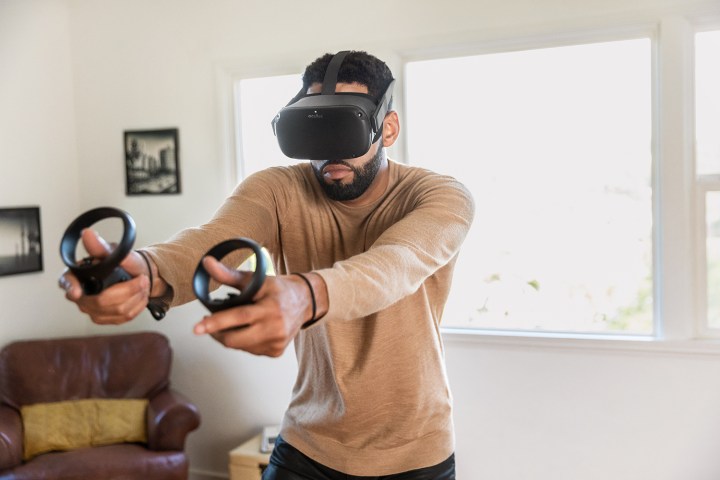
If you’re getting an Oculus Quest or Oculus Rift S headset on Christmas this year, there’s a good chance you’ll want to try it out right in your living room. While the bright lights on Christmas trees could have spelled trouble for the headsets’ controller-tracking technology in the past, Oculus has released an update that lets you play without issue next to brightly lit trees.
Oculus headsets track their motion controllers through a series of LED lights, similarly to how the PlayStation VR’s position is detected by the PlayStation Camera through lights on the headset itself. When playing next to a tree covered in its own lights, however, the software can have difficulty determining where the Oculus Touch controllers are positioned.
To counter this, the Oculus development team created a new algorithm designed specifically to detect 3D lights in an environment and reject them for use in determining a controller’s location. The algorithm was also designed to reject other light sources before they were even processed through the system, based on location from the camera, viewing angle, and distance from the image’s center, among other factors. Thanks to the improvements, Quest and Rift S users are now much less likely to have their Christmas tree accidentally mistaken for a controller, and should be able to enjoy their favorite virtual reality games in more locations.

Of course, being able to differentiate between Christmas lights and the tracking LED lights on your controllers will not be able to stop you from accidentally running into your Christmas tree, which is extremely likely in certain high-energy Oculus games. This is where the headsets’ guardian system comes in — it allows you to draw a virtual barrier around your position that will be highlighted when you get near the edge of it. Provided that you don’t have any small children or pets run into your play area, it provides a pretty foolproof way to avoid accidentally hurting yourself or breaking something.
If you haven’t purchased an Oculus Quest headset yet, you might have to wait a bit longer. It’s currently on back-order and units aren’t expected to arrive until February.
Editors' Recommendations
- Oculus Quest VR adds hand tracking for one-year anniversary
- Has Oculus Link let the Quest completely replace the Rift S?
- Oculus Rift S gets a release date, pre-orders are now available


